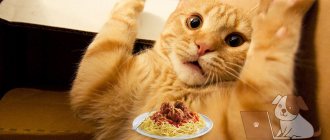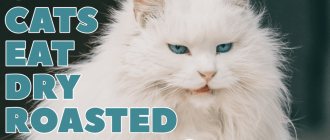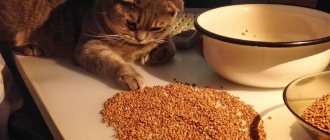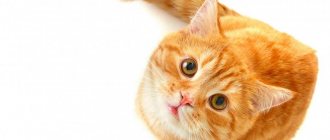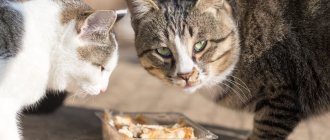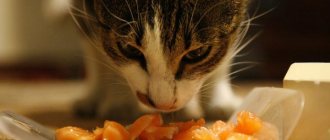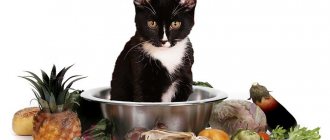People love sweets. Almost everyone, without exception, even those who convince themselves and others of the opposite. Love for something gives rise to our attitude towards this object as something taken for granted. We no longer control the amount of sweets we consume as closely as parents do with their young children.
Sometimes a person’s “little brothers” also get sweets. In particular, cats, which usually do not neglect the opportunity to enjoy dairy products, will never refuse condensed milk. It’s not surprising - according to the state standard, real condensed milk can only contain whole milk, cream, sugar and water. And if the safety of milk, cream and water does not raise questions, then with sugar everything is not so clear. So is it possible to give condensed milk to cats?
Special perception of taste
Any cat is primarily a predator. The main food of a predator is raw meat, or rather, animal white meat. A cat’s sense of smell is designed in such a way that the animal can recognize the smell of raw meat at a great distance from a potential victim. Some (mostly larger) representatives of the cat family can determine by smell how long ago the potential “food” died. This largely explains why even a domestic cat will never allow itself to eat stale meat or fish.
But here's what's really interesting: the receptors located in the cat's mouth are not able to recognize sweet taste. That is, purely hypothetically, a cat can eat as much sweet food as it wants without even feeling it. However, it is always worth remembering that the maximum consumption limits for various products for cats are several times lower than for humans.
For example, there have been cases when adult cats lost consciousness after eating a completely insignificant amount of chocolate by human standards. This is due to the high content of the hormone theobromine in cocoa beans, which in small quantities is an excellent tonic and stimulator of muscle activity. However, in large doses this hormone is dangerous even for humans, not to mention animals whose mass is only a few kilograms.
Eating means it’s not harmful?
A stunning statement in its ignorance. If this were true, veterinarians would not have to save cats every day from poisoning and toxic infections.
Indeed, cats, thanks to their acute sense of smell, can weed out obviously harmful food, but only to some extent. For example, some cats will happily eat chocolate, which even in small quantities can be fatal to them.
In the same way, cats are not protected from salmonellosis, botulism and other fatal troubles.
Dangerous source of protein
Human preferences in food culture played a cruel joke on his pets. On the one hand, people want to eat “real” condensed milk, which contains whole cow’s milk and cream, and on the other hand, such a natural product attracts the attention of domestic cats much more strongly.
Once having tasted the contents of the coveted jar and, naturally, not feeling anything other than milk protein and the taste of cream, the cat will eat the product in the same quantity as it would consume sour cream or milk. Owners of domestic cats probably understand the volumes we are talking about. Ultimately, along with the “cream,” the cat will eat a huge amount of sugar without even noticing it. Giving cats condensed milk is highly undesirable and there are several good reasons for this.
List of foods that should not be given to a cat:
- raw fish, bones and fish head
- sausage
- flour (bread, pasta)
- onion garlic
- nuts
- alcoholic drinks
- smoked meats, fried foods
- dairy products: milk, sour cream, cream
- chicken bones
- pickled vegetables
- large amount of liver
- pork
- grape
- sugar and foods high in sugar (chocolate, sweets, lollipops)
Why can't you feed your cat fish?
The domestic cat belongs to the mammals of the cat family of the order Carnivora. The basis of their diet is meat products. There is an opinion that cats eat fish, but this is not true. A man taught a cat to fish. In the wild, a cat is not able to catch fish; most cats are generally afraid of water.
A cat should not be fed raw fish . There is a high probability that worms may enter the pet’s body along with the fish. When the body is damaged by helminths, the gallbladder, liver, and pancreas are damaged.
Fish can be given to your cat in small quantities. It must first be boiled. Fish contains a large amount of salt, which affects the functioning of the kidneys, which can lead to urolithiasis.
You need to be extremely careful about the diet of castrated cats. Giving them fish in any form is not recommended.
Under no circumstances should you give your cat fish bones or fish heads. Fish also contains a large number of bones.
If you decide to give your cat fish, you need to boil it, remove all the bones and the head of the fish. The bones can damage the esophagus or intestines and cause bleeding.
Can adult cats be given milk?
Cow's milk contains lactose (milk sugar). Many cat owners see nothing wrong with feeding their cat cow's milk . But not all cats digest lactose equally well. In many cats, lactose intolerance can lead to indigestion, causing diarrhea or diarrhea.
If you feed your pet dry food, clean water should always be freely available. The animal should not be allowed to eat dry food and then milk.
You can replace cow's milk with low-fat fermented milk products. Such as kefir, low-fat unflavored yoghurts, fermented baked milk, or goat's milk.
Many cats love porridge. They should also be cooked in water, not milk. Do not under any circumstances add salt to the porridge or add sugar.
Can cats be given condensed milk?
Condensed milk, in addition to various additives, mainly contains cow's milk and sugar. Many cat owners mistakenly believe that cats can have “condensed milk.”
Some cats love condensed milk very much, as it contains animal protein. It is this protein that cats like so much, and not the sweet taste of condensed milk, as many owners think. Cats cannot taste sweets. They lack receptors with which they can sense sweet taste.
Condensed milk contains large amounts of sugar, which is harmful to cats. This can lead to digestive disorders and the development of diabetes.
This is interesting: Food GO! for cats - composition
Risk of developing diabetes
The amount of insulin required for the complete breakdown of sugar supplied with food is produced in a very limited amount in the cat’s body. This volume is not enough to process even small doses of sugar (after all, cats, being carnivores, practically do not need carbohydrates), not to mention a few spoons of condensed milk. In addition, the need for carbohydrates is largely determined by the animal's overall activity level. In stay-at-home cats it is reduced compared to more active representatives of the feline family.
Summarizing the above, consuming condensed milk can provoke diabetes in a cat, which will cause discomfort to the animal and a lot of trouble for the owners.
How is it useful?
The product has high energy and nutritional value. The vitamins and microelements included in the composition have the following effects:
- increase immunity;
- normalize the digestion process;
- strengthen bone and muscle tissue;
- improve blood circulation;
- calm the nervous system.
By giving your pet condensed milk, the animal, in addition to healthy proteins and fats, receives completely unnecessary sugar.
Risk of caries
Some owners are convinced that if you dilute a small amount of condensed milk with water, then consuming such a composition will cause virtually no harm to the animal. This is not true - in any case, this method will not prevent sugar from entering the cat’s digestive system.
Cats do not have the ability to brush their teeth, although even if they did, sugar would still cause irreparable damage to the enamel of the animal's small teeth. Oral diseases are one of the most painful for representatives of the cat family, and therefore their occurrence should not be provoked by unexpected inclusions in a balanced diet.
The benefits of condensed milk
Condensed milk can relieve constipation in cats. But only subject to prior consultation with a veterinarian and the absence of contraindications to the consumption of dairy products by animals. Preparing a sweet laxative is simple. Two teaspoons of condensed milk are diluted with water and poured into the cat's bowl. Usually cats eat this medicine with pleasure. The sweet mixture helps normalize the cat's stool.
Owners who want to pamper their furry pet with a protein treat are better off not opting for condensed milk. It is much healthier to treat your cat with a piece of meat - he will not refuse such a natural delicacy.
Condensed milk for cats and cats: all the pros and cons
Domesticated animals often inherit the habits of the people with whom they live under the same roof. Many of them may have a sweet tooth, just like their owners. Purrs love cakes, cookies, and halva. Of course, many of them like sweetened milk. What does it have to do with both regular white and boiled brown. However, is it possible to give such a delicacy to your pet?
Sweets are empty calories. Yes - it’s very tasty and you immediately feel a surge of energy. But this is where all the benefits of the sweet product end. But there are many reasons why it should not be consumed by both animals and people.
Why condensed milk is not recommended for cats
Those with a sweet tooth are at risk of gaining excess weight. In addition, pets move little and do not waste unused calories. Excess weight puts stress on your joints. The animal may become simply clumsy and will not be able to climb even onto a stool. Excess weight also puts a strain on the cardiovascular system.
When you eat sweets, your blood becomes of lower quality and thicker. The heart is forced to contract more often in order to pump it through the vessels. The walls of the latter begin to stretch and become thinner. There are high risks of blood clot formation and cardiac arrest. A sure sign that your pet needs to go on a diet is shortness of breath.
However, if there are still not enough arguments about whether a cat can have condensed milk, it is worth thinking about the fact that she, just like a person, can develop caries. Predators suffer when their teeth hurt. Animals do not take care of their mouths like humans. After your pet tastes something sweet, at best he will drink water. The animal will not brush its teeth or rinse its mouth with special decoctions. It won’t even be able to “tell” what exactly is bothering it.
The pet will be lethargic, apathetic, and will refuse to eat. The most likely symptom of toothache is bad breath. This is a real reason to visit the veterinarian. Dental treatment is performed under general anesthesia. Therefore, next time you should think again whether to give condensed milk to your cat or not. It is clear that some individuals can pity anyone and beg for anything. But we need to think about the health and future of animals, because they themselves do not know how harmful sweets can be.
In addition, if you are thinking about whether cats can have condensed milk, it should be noted that not all products that are on supermarket shelves correspond to the declared characteristics. There are a lot of fakes for condensed milk. Unscrupulous manufacturers, in order to reduce the cost of the product and increase profits, add various additives, such as milk powder, in addition to liquid cream and sugar. As a result, the well-known and beloved product “loses its original appearance.” Many fakes have only the name in common with traditional condensed milk.
Source
Sweets for cats
Cats are carnivores whose good food will always be meat products rich in protein. Sweets are not a necessity for cats; they are not perceived by the receptors and are even harmful to the cat’s body. Giving condensed milk to cats is strongly not recommended, due to the impossibility of its rational absorption. Limited insulin production in cats means they have difficulty digesting carbohydrates and sugar, which are found in excess in sweets. Poor glucose tolerance carries a risk of developing diabetes, obesity and digestive problems even after a spoonful of sweets.
Chocolate and other sweets made from cocoa beans are also contraindicated for cats, due to the presence of the alkaloid theobromine in them. Theobromine is a kind of poison for the cat family; when ingested, it causes severe poisoning and unpleasant symptoms of intoxication, the severity of which depends on the amount of sweet treat eaten. Based on all of the above, cats should not have chocolate and condensed milk - due to great damage to their health. Particularly susceptible are small kittens, old and adult animals with chronic diseases whose immune system is weakened.
Symptoms of “poisoning” with sweets:
- Diarrhea;
- Itching;
- Salivation;
- Watery eyes and purulent discharge from the eyes;
- Vomit;
- Rapid and heavy breathing;
- Changes in behavior (excitability, aggression, fatigue);
- Sleep problems.
It should be remembered that even a small amount of condensed milk can cause irreparable harm to a pet and significantly affect its condition with obvious unpleasant symptoms and hidden threats.
Consequences of the sweet life
Many owners may wonder why cats can’t have condensed milk, since it’s made from milk? Yes, indeed, cow's milk is the main ingredient of this delicacy, but we must not forget about the significant proportion of sugar in condensed milk. Sugar is harmful to cats and, if ingested, causes metabolic disorders, problems with hair and teeth. The likelihood of diabetes, obesity and digestive disorders increases significantly. In addition, milk and lactose may also not be tolerated by the digestive system of some cats, which also affects their health. Regularly feeding cats sweets causes addiction and the development of irreversible pathologies that can lead to the death of the animal.
Negative effects on cats from excess sugar:
- Diabetes;
- Obesity;
- Dental diseases (caries and tooth loss);
- Renal dysfunction;
- Decreased immunity;
- Vision problems;
- Hair loss and deterioration in its quality;
- Digestive disorders (vomiting, diarrhea);
- Premature aging;
- Abortion in pregnant cats;
- Thinning of capillary walls;
- Decreased activity of the pancreas;
- Deterioration of protein digestibility.
Can I give it to a cat?
Because of this product, the animal gets fat quite quickly.
Most veterinarians do not recommend adding condensed milk to a cat's diet. The main reason is poor insulin production. The cat's body does not tolerate glucose well, which leads to diabetes, weight gain and gastrointestinal problems. Even a small amount of sweets can cause diarrhea in a healthy animal. Therefore, condensed milk should not be given to cats. The exception is condensed cream and milk, which do not contain sugar. These products can be introduced into the kittens' menu after diluting them with water, as they contain a large amount of fat. Experts advise giving condensed milk only in emergency cases, for example, as a laxative for cats.
Use for constipation
Constipation is often observed in cats. In this condition, stool accumulates and hardens. The animal has difficulty with both diarrhea and constipation. It feels painful and uncomfortable. The causes of the disease may be the following factors:
- improper diet;
- accumulation of hairballs in the intestines after washing;
- ingestion of foreign bodies;
- sedentary lifestyle;
- dehydration of the body;
- neoplasms of benign and malignant nature;
- kidney diseases;
- worms and other parasites;
- inflammation and growths.
If a pet is sick, it may become lethargic, to which its owner must react.
When the disease manifests itself, cats behave differently, but it is not difficult to notice the disturbances. The pet can be absolutely calm and lethargic with a complete lack of appetite, or, on the contrary, it can run around the room and meow loudly. Constipation also causes bloating and vomiting. The animal noticeably loses weight, stops licking itself, and experiences difficulty breathing. The main indicator is a dry nose.
Before starting any treatment, it is important to consult a veterinarian. Only after a correct diagnosis can laxatives be used. The fact is that constipation's symptoms are similar to intestinal obstruction, and this disease is treated completely differently. Condensed milk is a good remedy for constipation in cats. Preparing a laxative is very simple. Need 2 tsp. Dilute condensed milk with water and pour into a saucer. As a rule, the animal eats this medicine with pleasure. This mixture easily and painlessly treats constipation. It softens the stool, after which the stool returns to normal. However, this method of treatment should be used only in a situation where the cat has no contraindications to consuming dairy products or any concomitant diseases.
Condensed milk poisoning in pets
Who would have thought that animals could be poisoned by condensed milk? However, it is quite possible. Of course, not every pet eats condensed milk , and even if it does, it is in small quantities. But still, some cats sometimes like to try it.
So in March 2012, a 7-year-old cat named Sema just licked a small amount of this delicacy. After 2.5 hours, he fell into a semi-comatose state with symptoms of hyperesthesia (increased sensitivity to tactile and sound stimuli), epileptic seizures and severely dilated pupils (mydriasis).
This is an extreme version of intoxication, although quite classic.
The fact is that canned food in general and condensed milk especially contain a high concentration of preservatives.
Let's not forget about the milk of which cows the condensed milk is made from - leukemic milk from cows positive for leukemia. And cow leukemia, by the way, is supposedly harmless to the human body, nevertheless, it can provoke the development of oncology, and God knows what a nonspecific virus can do, even if not in the body of its genetically intended host. But this is, of course, a separate topic. So, in the production of condensed milk, a preservative . And if its concentration is exceeded for some reason, then this can lead to symptoms similar to those of a nervous system disorder (a consequence of intoxication). And, if this type of preservative is not particularly dangerous for humans, then it is quite dangerous for representatives of the cat family, especially in high concentrations. This is quite a threatening sign. A pet without appropriate treatment may die. But by prescribing appropriate detoxification therapy, one can hope for a successful outcome.
A course of infusions (droppers) of glucose, rheopolyglucin, rheosorbilact in combination with oral sorbents (enterosgel, white coal, phytosorbent, etc.) with the support of drugs that stimulate the cardiovascular system (cordiamin, sulfocamphocaine, etc.), vitamin preparations (oligovitis, aminovit) and hepatoprotectors (Essentiale, silymarin, etc.) helps to easily achieve positive results of such therapy. Usually, on 3-5 days from the start of treatment, positive dynamics can be observed.
Pet owners need to take a more thoughtful approach to feeding them sweets and, especially, condensed milk. Moreover, recent toxicological studies have shown elevated levels of titanium dioxide and heavy metals in condensed milk.
Source

